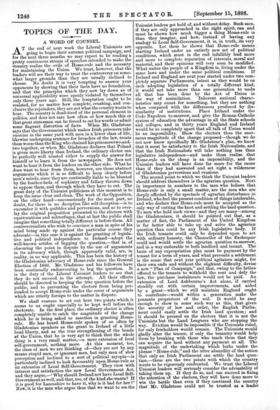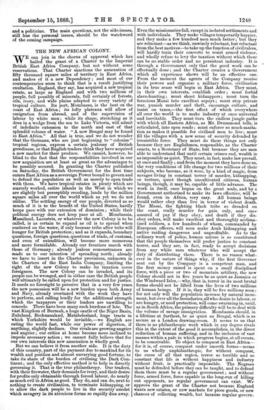TOPICS OF THE DAY.
A WORD OF COUNSEL.
AT the end of next week the Liberal Unionists are going to begin their autumn political campaign, and for the next three months we may expect to be reading a pretty continuous stream of speeches intended to make the country realise the evils of Home-rule and the necessity for maintaining the Union. We trust, however, that the leaders will see their way to treat the controversy on some- what larger grounds than they are usually inclined to choose. No doubt it is very tempting to answer your opponents by showing that their facts have no foundation, and that the principles which they now lay down as of universal applicability were openly violated by themselves only three years ago. Still, the temptation ought to be resisted, for no matter how complete, crushing, and con- clusive the rejoinders, they are not what the country wants to hear. The country is dead-tired of the personal element in politics, and does not care how often or how much this or that great statesman can be forced to eat his words or admit some flagrant distortion of facts. When Mr. Gladstone says that the Government which makes Irish prisoners take exercise in the same yard with men in a lower class of life, likewise undergoing sentence for breaches of the law, treats them worse than the King who chained his prisoners two-and- two together, or when Mr. Gladstone declares that Poland is given more liberty than Ireland, the ordinary elector can be perfectly well trusted either to supply the answer for himself or to learn it from the newspapers. He does not want to hear it from the leaders on the other side. What he does want to hear from them, however, are those abstract arguments which it is so difficult to keep clearly before men's minds, since they are continually liable to be blunted by the feather-beds of sophistry and fallacy thrown down to oppose them, and through which they have to cut. The great duty of the Unionist politicians at this moment is to keep the issue clear and clean. The work of the Opposition, on the other hand—unconsciously for the most part, no doubt, for there is no deception like self-deception—is to encumber it with quibbles and perversions, and so to over- lay the original proposition presented to the electors with equivocations and subterfuges, that at last the public shall imagine that something totally different is before them. All controversialists who wish to convince a man in spite of his mind being made up against the particular course they advocate—in this case it is against the granting of legisla- tive and political independence to Ireland—adopt the well-known artifice of begging the question,—that is, of obscuring the point in dispute by the use of arguments in its advocacy which, though apparently valid, are, in reality, in no way applicable. This has been the history of the Gladstonian advocacy of Home-rule since the General Election of 1886. Mr. Gladstone and his followers have been continually endeavouring to beg the question. It is the duty of the Liberal Unionist leaders to see that they do not succeed in the attempt, All their efforts should be directed to keeping the true question before the public, and to preventing the electors from being per- suaded to accept Home-rule under the cover of arguments which are utterly foreign to the matter in dispute.
We shall venture to set out here two points which it seems to us ought especially to be kept well before the electorate. In the first place, the ordinary elector is often completely unable to catch the magnitude of the change which he is being asked to sanction in granting Home- rule. He has heard Home-rule spoken of so often by Gladstonian speakers as the grant to Ireland of a little local liberty, and as the true strengthening of the bonds of the Union, that be is very apt to think that the whole thing is a very small matter,—a mere extension of local self-government, nothing more. At this moment, too, the class of men we are thinking of—they are not by any means stupid men, or ignorant men, but only men of slow perception and inclined to a sort of political myopia—is particularly inclined to look favourably upon Home-rule as an extension of Local Self-Government. They view with interest and satisfaction the new Local Government Act, and they argue,—'Why should Ireland not have Local Self- Government as well, and that, too, of the kind she wants ? If it is good for Lancashire to have it, why is it bad for her ?' Now, it is the men who argue thus that we want to see the Unionist leaders get hold of, and without delay. Such men, if they are only approached in the right spirit, can and must be shown how much bigger a thing Home-rule is than they imagine, and how, instead of having any analogy to Local Self-Government, it is, in truth, its very opposite. osite Let them be shown that Home-rule means starting Ireland under an entirely new set of political conditions, which must in the end infallibly lead more and more to complete separation of interests, moral and material, and their opinions will very soon be modified. What unites the people of a Kingdom is, living under the same laws and under the same political conditions. If Ireland and England are next year started under two com- pletely separate Parliaments, intent as they would be on each adopting legislation of a totally different kind, it would not take more than one generation to under all that has been done by the Act of Union in the way of assimilation. Inherent national charac- teristics may count for something, but they are nothing when compared with the differences produced by dis- similarity of institutions. Place Ireland under the Code Napoleon to-morrow, and give the Roman Catholic system of education the advantage in all the State schools. and colleges, and in thirty years England and Ireland would be so completely apart that all talk of Union would be an impossibility. Show the electors thus the enor- mous magnitude of the change proposed—though we do not now know specifically Mr. Gladstone's plan, we know that it must be satisfactory to the Irish Nationalists, and that the Irish Nationalists will take nothing less than legislative independence—and make them realise that Home-rule on the cheap is an impossibility, and the Unionist leaders will have done far more for the causs than if they had answered and set right a wildernese of Gladstonian perversions and evasions.
The second point to which we think the Unionist leaders should address themselves is the agrarian question. Next in importance in numbers to the men who believe that Home-rule is only a small matter, are the men who are deeply affected by the spectacle of agrarian disturbance in Ireland, who feel the present condition of things intolerable, and who declare that Home-rule must be accepted as the only way of cutting the knot and settling the land question.. To men who hold such views—and they are many—among the Gladstonians, it should be pointed out that, as a matter of fact, the Parliament of the United Kingdom is far better able to take up and solve the agrarian question than could be any Irish legislative body. If the Irish tenants could only be depended upon to act with ordinary honesty, the Chancellor of the Exchequer could and would settle the agrarian question to-morrow, and in a way endurable to both landlord and tenant. The basis of any expropriation plan must be payment by the tenant for a term of years, and what prevents a settlement is the sense that next year political agitators might, for their own ends and without the slightest difficulty, devise a new " Plan of Campaign," and that, owing to the bribes offered to the tenants to withhold the rent and defy the law, the purchase instalments would not be paid. An extension of Lord Ashbourne's Act alone, if carried steadily out with certain improvements, and aided by a grant—which we still maintain England ought to contribute—would within a generation make the peasants proprietors of the soil. It would be easy enough to show in some such way as this, that given the security of law and order, the English Parlia- ment could easily settle the Irish land question ; and it should be pressed on the electors that it is not the Unionists but the Land Leaguers who are stopping the way. Eviction would be impossible if the Unionists ruled, for only freeholders would remain The Unionists would gladly alter the tenure, if only the tenantry would. help them by breaking with those who teach them that they can acquire the land without any payment at all. The magnitude of the undertaking which lurks under the phase " Home-rule," and the utter absurdity of the notion that only an Irish Parliament can settle the land ques- tion,—these are the two points with which the country wants to be vigorously confronted. We trust the Liberal Unionist leaders will seriously consider the advisability of taking them up. If they do so, and can succeed in fixing the attention of the electors, they will have done more to win the battle than even if they convinced the country that Mr. Gladstone could not be trusted as a leader and a politician. The main questions, not the side-issues, still less the personal issues, should be the watchword of the coining campaign.



































 Previous page
Previous page